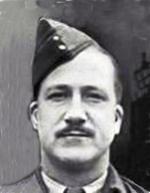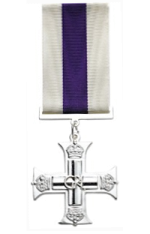William Alexander “Bill” Ewener was born in London in 1905, and in 1908 immigrated with his family to Canada, where they settled in Sarnia Ontario.
At the age of only 12, Bill became an apprentice machinist for the Grand Trunk Railroad while in high school. He later worked in Peru for a number of years in the 1920s and '30s as an engineer for Imperial Oil before returning to London to finish his education. He had played football for the Sarnia Collegiate junior and senior teams, the intermediate Wanderers, the Sarnia Imperials (lineman) and the University of Western Ontario Mustangs (centre). He graduated with a B.A. in his early 30s. While at university, Bill also wrested and was an undefeated champion.
When the Second World War broke out, Bill volunteered for active service in the 11th Field Company, Royal Canadian Engineers at the age of 34 years. He was later transferred to the 7th Field Company and selected to take part in the Dieppe Raid.
Early on the morning of 19 August 1942 and shortly after he leapt ashore leading his sappers at the head of a group of The Royal Hamilton Light Infantry on WHITE BEACH, he was struck in the chest by a machine gun bullet. In spite of his wounds, he organized his demolition party and attempted to cross the beach and esplanade still exposed to extremely heavy machine gunfire. His targets were roadblocks in the town.
Despite the insistence of others that he withdraw from the action, Bill refused. He picked up the equipment of another wounded man and carried a 50- or 75-pound charge towards the Casino with the intention of passing through the building to get at the roadblocks, especially the one across the Rue de Sygogne to open the way south into town. Several of his men were hit on the way and when he got to the Casino, he was too weak to go any further. Lance- Corporal M. D. Sinasac, 11th Field Company, took over, and Bill stayed behind. Later that day he was seen dressing the wounds of wounded comrades. “He refused to withdraw until the last cat was hung” one of his comrades told Fred Griffin, noted war correspondent of the Toronto Daily Star.
After his evacuation from Dieppe, he spent more than six months in hospital in England. During his recovery from the bullet wounds in his chest and the shrapnel wounds in his legs, he wrote to his parents in Sarnia. He did not refer to the action, to how he was wounded, nor to the extent of his wounds. He assured his parents that he was well on the way to recovery. In expressing thanks to his Sarnia, London and Toronto friends, he wrote, “The tears were very close to my eyes when the cables started to arrive from so many friends back home. It hardly seemed possible that so many would act spontaneously at such a time… It was certainly a grand way to cheer me up when things looked blackest.” In writing about his recovery in hospital, “The first week we spent here was marvelous despite the pains of our wounds and the sharpness of our tempers as all of us were incensed we had to leave good friends in unfriendly territory. Everyone is impatient to get back in harness and help avenge those we left behind.”
On release from hospital, Bill returned to active duty with the 30th Field Company, 2nd Canadian Corps Engineers. He landed in Normandy in early July 1944 and stayed with the Canadian Army’s advance through France, Belgium and Holland. He was wounded a second time in Holland when a munitions truck in his convoy was hit by a shell and caught fire. After recovering from these wounds, he was promoted to Acting Major and took command of the 30th Field Company until the war ended.
After VE Day, he volunteered for duty in the Pacific as a company commander in Lt-Col Malcolm Sutherland-Brown’s 6th Combat Engineer Battalion and returned to Canada to help organize and train the unit. Fortunately, the war there ended before he could be deployed.
Bill returned to UWO, where he completed medical school. He practiced family medicine in the London area into his 80s and was active in the Military Engineer Association of Canada. He used to speak very little about the war unless friends were telling stories. Bill died in London ON on 10 August 2001 at the age of 96 years.
Landing with the first wave of attackers from the Royal Hamilton Light Infantry, Lieutenant Ewener suffered chest wounds almost immediately on reaching White Beach at Dieppe, 19 August 1942. In spite of his wounds he organized his demolition party and attempted to cross the beach and esplanade, although exposed to extremely heavy machine gun fire, in order to reach a roadblock objective. When more of his men were wounded he carried a 75-pound charge of explosives as far as the Casino. Lieutenant Ewener continued to show great determination throughout the entire operation and refused to leave until the last groups were taken from the beach.


